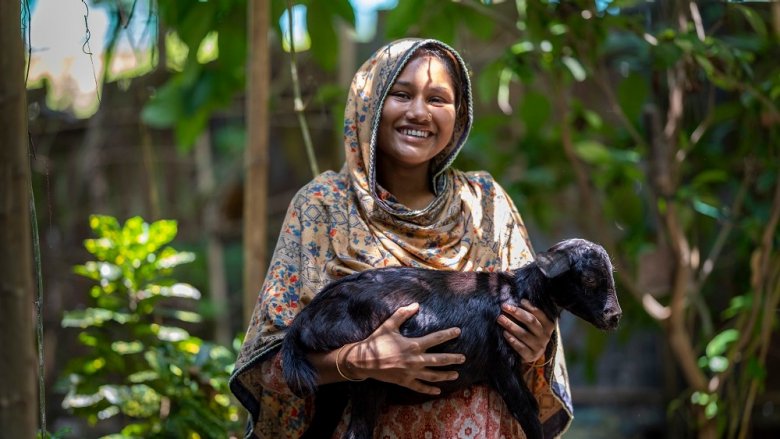Challenge
Despite Bangladesh¡¯s notable progress in human development, close to one-third of children under five are affected by stunting, which has implications for longer term cognitive development and their future as adults. Poverty hinders access to the knowledge and services necessary for early childhood development, and this is reflected in poor households¡¯ higher rates of stunting, wasting, and mortality. Underlying causes of limited early childhood development include household food insecurity due to insufficient income; inadequate care, feeding, and parenting practices; an unhealthy household environment; and inadequate capacity of local governments to manage and coordinate health services. Low use of antenatal care leads to a high incidence of low birth weight and maternal malnutrition. Poor childhood outcomes, especially affecting children from poor and vulnerable households, undermine their human capital development potential. Ensuring adequate early childhood cognitive development can prevent devastating permanent effects on children¡¯s intelligence and brain development.
Approach
In 2015, the Government of Bangladesh launched the Income Support Program for the Poorest (ISPP), also known as Jawtno (care in Bangla). The program supported 600,000 poor pregnant women and mothers with children under five years, in locations with high child malnutrition and poverty rates. It provided cash payments to incentivize the parents¡¯ use of services aimed at improving their children¡¯s nutrition, cognitive development, and readiness for school. While cash payments were initially conditional on service utilization, following onset of the COVID-19 pandemic, the program was made unconditional, but continued to have strong beneficiary participation. A significant element of the program was strengthening of local government delivery services, both in-house and outsourced, accompanied by partnerships with service providers such as the Ministry of Health and Family Welfare and NGOs. This enabled more than $121 million to be paid out through biometrically-authenticated processes to ensure funds were directly received by the poor beneficiary.
Results
Qualitative assessments, including spot checks, process evaluations, and interviews with program implementors and beneficiaries, during the program¡¯s implementation between October 2017 to December 2021 found that:
A higher uptake of antenatal care promoted the wellbeing of mothers and their children. Almost 90 percent of participating pregnant women received antenatal care, with around half completing all four visits. Mothers credited the visits with ensuring safe delivery of their healthy children.
Regular growth monitoring encouraged parents to provide better care. Over 90 percent of mothers brought their children to community clinics for regular growth monitoring. Use of growth charts helped mothers identify any health issues and take remedial action.
Mothers spent more quality time with children. Mothers said they found the counseling sessions improved their parenting skills, encouraging them to use positive feedback and not resort to physical means of disciplining children. The program provided toys and interactive games to help mothers and children bond. Ninety-six percent of mothers found the information provided at the sessions useful; they also shared their knowledge with non-participating mothers, and the entire community benefitted.
Learning by play. Mothers reported that engaging in activities such as games, storytelling, and nursery rhymes together with other children helped build their children¡¯s confidence and better prepare them for school.
Mothers have the money to spend on their children¡¯s development. The program worked to ensure that participating mothers had the means to act on what they learned about child nutrition and early learning. Eighty-eight percent of mothers used the money to buy nutritious food, and 40 percent bought livestock or set up small poultry farms or vegetable gardens that became a regular source of nutrition and income. The additional income made the mothers economically empowered.
Bank Group Contribution
ISPP was informed by the success of the $2.1 million Shombhob (¡°possible¡± in Bangla) pilot, financed through a World Bank Rapid Social Response (RSR) grant in 2011. Positive findings from the pilot evaluation led to the government¡¯s request for project financing and eventual World Bank support of $250 million for ISPP. The project benefited from other Trust Fund resources, including the RSR and Early Learning Partnership, which funded the child nutrition and cognitive development curriculum and World Bank-commissioned process and qualitative assessments.
Partners
Å·ÃÀÈÕb´óƬ is working closely with other major development partners through the Child Benefit Program Working Group to harmonize efforts on design, implementation, and investment to support the ¡°early years¡± agenda in Bangladesh. Lessons from ISPP have been a key input in informing other partners¡¯ work and realizing the critical role of the implementing agency, the Local Government Division, in coordinating the social protection service delivery chain at the field level.
Looking Ahead
As ISPP comes to a close in 2022, the government has requested new financing to continue to strengthen and broaden its support to the ¡°early years¡± agenda. Building on the strength of the implementing agency to coordinate services at the local level, the proposed project currently under preparation will focus on increasing access to critical early childhood development services for poor and vulnerable households.
Beneficiaries
Sufia Begum is a Jawtno beneficiary from Hatibandha, one of the poorest locations in Bangladesh. After marrying against her family¡¯s wishes, she fell into severe poverty and her daughter was born malnourished. After enrolling in Jawtno, Sufia Begum received practical information on how to improve her daughter¡¯s nutrition and ensure her health and cognitive development. The money from the program helped her buy livestock, providing sustained income and nutritious food for her family. Sufia also benefited from antenatal care visits and delivery care when she became pregnant again. She credits Jawtno for the turnaround in her family¡¯s circumstances by ¡°providing light on her uncertain future, helping them become self-sufficient, and improving the health of her children¡±.
